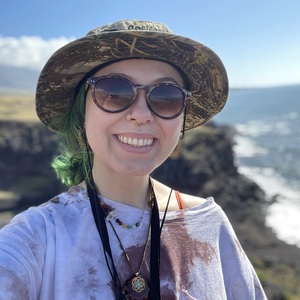-
 Chris LoConti 3/31/2021 5:32 PMThanks for posting Colleen! Here's a great resource if you're interested in learning more about regenerative agriculture: https://regenerationinternational.org/why-regenerative-agriculture/
Chris LoConti 3/31/2021 5:32 PMThanks for posting Colleen! Here's a great resource if you're interested in learning more about regenerative agriculture: https://regenerationinternational.org/why-regenerative-agriculture/ -
 Nathan Hungate 3/31/2021 11:34 AMYes and no Colleen, Organic systems are quite complex. Yes on the soil biodiversity increasing crop yields, 100% there. No in that organic systems are often much harder to facilitate and more fragile than that of their mono-cropping genetically altered peers. For example, it's very hard to farm organic crops in the midwest due to the fact that much of the soil has already been destroyed/depleted and yields are much less than gmo crops designed to be drought, insect, pesticide resilient. Indeed organic systems and soil are more biodiverse and key to long term agriculture. However, they are also much more fragile to the elements in many instances and the farms can often receive much smaller margins and fewer large scale investments which means 1-2 bad years of hurricanes, droughts, etc. can more easily bankrupt small organic farms. Soil farming and biodiversity is key, but developing resilient economic models for organic farming will require an increasing amount of greenhouse gardening and innovation/investment heading forward. Organic is hard, it's continuous spraying of neem, and OMRI certified horticultural and mineral oil. It's labor hours to check to ensure pests are not creeping up due to the fact that you're not spraying as invasive of chemicals which kill a much higher amount of insects/pathogens. It's more expensive seed and often lower yields compared to GMO peers which design high yield products but sacrifice nutrient density. It's really knowing what you're doing and hoping that mother nature plays well in your pursuit of smaller margins (for the majority of organic farms) makes it quite difficult. Also, hurricanes and fires and the like can disrupt the often more traditional means of Organic farms selling their produce at local farmers markets and CSA's and whatnot. These independent systems are more decentralized and more resilient models, but can also be susceptible to weather or pandemic related issues such as having many farmers markets closed for the majority of last year for example, whereas conventional stores were allowed to remain open. This was a very unfortunate reality of the Organic model, and is something I'm keen in learning and investing more in.
Nathan Hungate 3/31/2021 11:34 AMYes and no Colleen, Organic systems are quite complex. Yes on the soil biodiversity increasing crop yields, 100% there. No in that organic systems are often much harder to facilitate and more fragile than that of their mono-cropping genetically altered peers. For example, it's very hard to farm organic crops in the midwest due to the fact that much of the soil has already been destroyed/depleted and yields are much less than gmo crops designed to be drought, insect, pesticide resilient. Indeed organic systems and soil are more biodiverse and key to long term agriculture. However, they are also much more fragile to the elements in many instances and the farms can often receive much smaller margins and fewer large scale investments which means 1-2 bad years of hurricanes, droughts, etc. can more easily bankrupt small organic farms. Soil farming and biodiversity is key, but developing resilient economic models for organic farming will require an increasing amount of greenhouse gardening and innovation/investment heading forward. Organic is hard, it's continuous spraying of neem, and OMRI certified horticultural and mineral oil. It's labor hours to check to ensure pests are not creeping up due to the fact that you're not spraying as invasive of chemicals which kill a much higher amount of insects/pathogens. It's more expensive seed and often lower yields compared to GMO peers which design high yield products but sacrifice nutrient density. It's really knowing what you're doing and hoping that mother nature plays well in your pursuit of smaller margins (for the majority of organic farms) makes it quite difficult. Also, hurricanes and fires and the like can disrupt the often more traditional means of Organic farms selling their produce at local farmers markets and CSA's and whatnot. These independent systems are more decentralized and more resilient models, but can also be susceptible to weather or pandemic related issues such as having many farmers markets closed for the majority of last year for example, whereas conventional stores were allowed to remain open. This was a very unfortunate reality of the Organic model, and is something I'm keen in learning and investing more in.
Colleen Curry
"Failure is not the opposite of success, but apart of success. "
POINTS TOTAL
- 0 TODAY
- 0 THIS WEEK
- 55 TOTAL
Colleen's actions
Food, Agriculture, and Land Use
Support Local Food Systems
Plant-Rich Diets
I will source 50 percent of my food from local producers each day. This could include signing up for a local CSA, buying from a farmer's market, visiting a food co-op, foraging with a local group, or growing my own ingredients.
Food, Agriculture, and Land Use
Donate garden produce to a local nonprofit for low income college students at Sacramento City College.
My goal is to give back to the school that I used to attend by donating fresh produce from my garden to a few students on campus through the food program! I chose this because during the roughest of times it was the people who were dropped by fresh produce from their gardens to contribute to the students house, that really just made my day. It brought in my palate, and helped me eat a lot healthier at a time in my life where I needed the most nutrients to progress in my studies.
Food, Agriculture, and Land Use
Learn More about Regenerative Agriculture
Conservation Agriculture, Regenerative Annual Cropping
I will spend at least 35 minutes learning about the need for more regenerative agriculture.
Food, Agriculture, and Land Use
Learn the Truth About Expiration Dates
Reduced Food Waste
I will spend at least 15 minutes learning how to differentiate between sell by, use by, and best by dates.
Food, Agriculture, and Land Use
Support Indigenous Peoples' Land Management
Indigenous Peoples' Forest Tenure
I will donate to Native American Rights Fund, which protects tribal natural resources and environmental rights and promotes Native American Human Rights.
Food, Agriculture, and Land Use
Give a Microloan
Sustainable Intensification for Smallholders
I will give 3 microloan(s) to women who need help starting a business.
Participant Feed
-
REFLECTION QUESTIONFood, Agriculture, and Land UseClean air, clean water and healthy food are just three reasons to care about regenerative agriculture. What are some other reasons? How could/does regenerative agriculture positively impact you and your community?
 Colleen Curry 3/24/2021 11:40 PM“under organic systems are likely to be more resilient to extreme weather… in drought years, yields were consistently higher in the organic system. For instance, organic corn yields were 28-to-34% higher than conventional.” In general, having resilient crops comes back to the soil and increasing soil biodiversity. By ensuring your soils are healthy and teeming with beneficial soil microbes, you can naturally displace and suppress disease”.
Colleen Curry 3/24/2021 11:40 PM“under organic systems are likely to be more resilient to extreme weather… in drought years, yields were consistently higher in the organic system. For instance, organic corn yields were 28-to-34% higher than conventional.” In general, having resilient crops comes back to the soil and increasing soil biodiversity. By ensuring your soils are healthy and teeming with beneficial soil microbes, you can naturally displace and suppress disease”.
